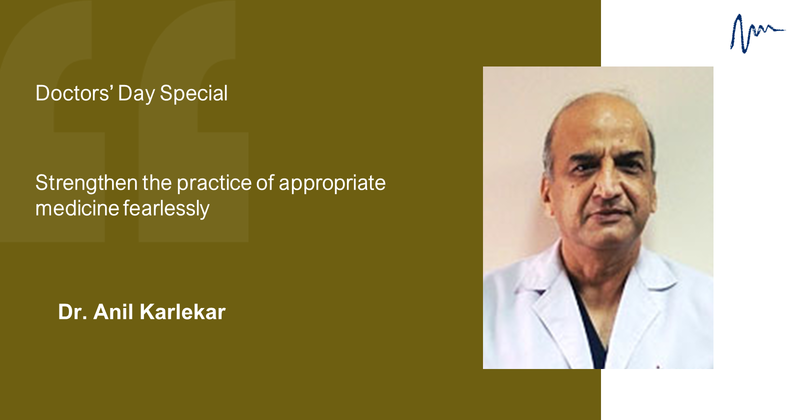Strengthen the practice of appropriate medicine fearlessly- Dr Anil Karlekar
M3 India Newsdesk Jul 01, 2018

Here is wishing all the doctors a very happy doctors day.To celebrate the Doctor's day, team M3 India gets to you special messages and articles for this entire week. Today we feature Dr Anil Karlekar, a seasoned Cardiac Anaesthesiologist, who shares professional experiences over the last four decades and details new skill sets Indian doctors need in the present day scenario.

When I look back at my journey of more than 4 decades as a doctor, I am tempted to think how I would have liked to see certain things done differently. Admittedly, four decades have seen major changes in the country and the society that we live in, and in me as well, as an individual, hence some of the thoughts may have been out of the retrospective wisdom and logically would be in danger of becoming irrelevant again in future as time passes by!
Mindset shift and the ‘Doctor-Patient equation’
Not only me, but most of the doctors today are perturbed and pained by the current patient-doctor equation, the trust having been replaced by mutual suspicion: the paradox of today’s healthcare systems wherein the faith in the promise of technology is on the rise but trust in the system has seen its lowest nadir.
Patients scrutinise every advice coming from doctors for a possible commercial angle, and doctors do think before giving an opinion if they should rather play safe! Both sides can be blamed for the current state of affairs but one particular component that I see sadly missing is proper communication.
A need for better communication
Communication is undoubtedly an art but there is a lot of science behind it and that is why I feel it should become part of the medical curriculum. Some are naturally gifted with this art, but the majority have remained untouched and are not even aware of its importance. Regular structured programs should be designed to teach prospective doctors the nuances of all forms of communication (verbal, para-verbal and nonverbal), including sessions on grief counselling and breaking bad news to patients.
I do believe, that in the present-day atmosphere of mistrust and misinformation, pieced together from the internet and unsolicited advice from self-styled well-wishers of patients, proper communication can help clear lot of bad air!
Training on documentation is mandatory
Another skill that is sadly lacking is proper documentation. A patient record should be complete, and one should be able to piece together full story out of what patient has gone through based on proper documentation. While one does occasionally come across individual brilliance depending on someone having been trained by a gifted mentor, the general standards are appalling!
It is high time, we train the budding doctors all about documentation like we teach them history taking and clinical examination.
Handling medico-legal issues
And close on the heels of proper documentation, another aspect which is gaining huge importance in the current context is medicolegal issues. We have seen many doctors studying law and many have actually switched their primary profession after gauging the current compulsions. It is high time we include medicolegal principles as part of undergraduate curricula.
The idea should not be to advocate practice of defensive medicine but to strengthen the practice of appropriate medicine fearlessly, ensuring one remains on the right side of the law.
We all learn from our mistakes and this is nowhere truer than in the instance of current medicine that has evolved and continues to evolve, picking up pearls of wisdom from the account of collective mistakes that clinicians inadvertently make and then honestly share with the fraternity. It is not easy to admit your errors, it makes you feel lesser in the eyes of your peers, or so one feels.
Additionally, in the present-day environment of libels and lawsuits, where clinicians fear being pronounced guilty by the media and those who wish to score a political point even before the trial starts, the culture of acknowledging your mistakes is in danger of vanishing, eventually hurting the evolution of medicine.
And while the clinicians need to learn law as mentioned earlier, why shouldn’t there be orientation courses in medical colleges for the judges before they are assigned the benches that decide cases of medical negligence.
It would be a lot easier for them to appreciate the other side of medicine like the concept of acknowledging genuinely inadvertent errors versus willful negligence. This is not to doubt the competence of the judiciary, but just to enhance the cause of justice.
After all, with the trust deficit between patients and clinicians widening by the day, we can expect more and more complaints against doctors, further pushing them into defensive medicine and eventually hurting the interests of patients!
Pearls of wisdom
And finally, as I face retirement, I feel uncomfortable since I have known nothing but medicine in my life. An advice to all, particularly to youngsters: do develop a hobby or two, some that involve physical activity and others that can keep you engaged even when you are sedentary!
Disclaimer- The views and opinions expressed in this article are those of the authors and do not necessarily reflect the official policy or position of M3 India.
-
Exclusive Write-ups & Webinars by KOLs
-
Daily Quiz by specialty
-
Paid Market Research Surveys
-
Case discussions, News & Journals' summaries